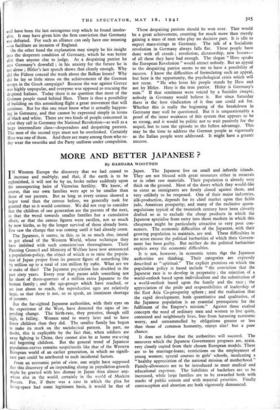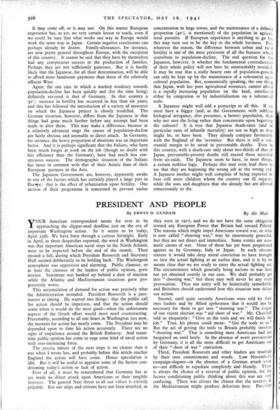MORE AND BETTER JAPANESE?
By BARBARA WOOTTON TN Western Europe the discovery that we had ceased to 1 increase and multiply, and that, if the earth is to be replenished, it will not be by us, broke rather suddenly upon the unsuspecting heirs of Victorian fertility. We knew, of course, that our own families were apt to be smaller than those of our parents. But as long as every census showed a larger total than the census before, we generally took for granted that so it would continue. We did not stop to consider that the children of one generation are the parents of the next, so that the trend towards smaller families has a cumulative effect; or that the census figures were swollen, not so much by new births, as by the longer survival of those already born. Few saw the change that was coming until it had already come.
The Japanese, it seems, in this, as in so much else, intend to get ahead of the Western World, whose technique they have imbibed with such conscientious thoroughness. Their Planning Council and Ministry of Welfare have now announced a population-policy, the object of which is to raise the popula- tion of Japan proper from its present figure of something like 73 million up to a total of too million by 1960. What are we to make of this? The Japanese population has doubled in the past sixty years. Every year that passes adds something not far short Of three-quarters of a million extra Japanese to the human family ; and the age-groups which have reached, or are just about to reach, the reproductive ages are relatively large, so that there is not, so to speak, an imminent shortage of parents.
But the far-sighted Japanese authorities, with their eyes on the experience of the West, have detected the signs of im- pending change. The birth-rate, they perceive, though still high, is falling. Women tend to marry later and to have fewer children than they did. The smaller family has begun to make its mark on the sociological pattern. In part, no doubt, this is explicable by the fact that, when soldiers are away fighting in China, they cannot also be at home ma! tying and begetting children. But the general trend of Japanese population-curves remains suspiciously like that of the Western European 'world of an earlier generation, in which no signifi- cant part could be antributed to such incidental factors.
From an economic point of view, one might have supposed that this discovery of an impending slump in population-growth might be greeted with less dismay in Japan than almost any- where else in the world, certainly in the world of Modern Powets. For, if there was a case in which the plea for living-space had some legitimate basis, it would be that of Japan. The Japanese live on small and infertile islands. They are not blessed with great resources either in minerals or in other raw materials. Their population is already very thick on the ground. Most of the doors which they would .like to enter as immigrants are firmly dosed against them, and very unlikely to be reopened. One of their major industries, silk-production, depends for its chief market upon that fickle jade, American prosperity; and many of the exclusive quota- regulations typical of the twentieth century have been cleverly drafted so as to exclude the cheap products in which the Japanese specialise from entry into those markets in which this cheapness might be particularly attractive to very poor con- sumers. The economic difficulties of the Japanese, with their growing population to maintain, are real. These difficulties in no sense excuse the political barbarities of which their Govern- ment has been guilty, But neither do the political barbarities explain away the economic difficulties.
It is not, however, in economic terms that the Japanese authorities are thinking. Their categories are expressly described as "spiritual." The explicit premises on which the population policy is based include "the conviction that the Japanese race is to develop in perpetuity ; the rejection of a world-outlook based upon individualism and the substitution of a world-outlook based upon the family and the race ; the appreciation of the pride and responsibilities of leadership of the East Asia Co-prosperity sphere ; and the realisation that the rapid development, both quantitative and qualitative, of the Japanese population is an essential prerequisite for the fulfilment of the Empire's mission." Against these exalted concepts the need of ordinary men and women to live quiet, contented and neighbourly lives, free from harassing economic worry, and untrammelled by obligations greater or less than those of common humanity, enjoys alas! but a poor chance.
It does not follow that the authorities will succeed. The measures which the Japanese Government proposes are, again, very closely copied from their chosen European models. There are to be marriage-loans; restrictions on the employment of young women; special courses in girls' schools, inculcating a "healthy appreciation of the national mission of motherhood." Family-allowances are to be introduced to meet medical and educational expenses. The liabilities of bachelors are to be increased, while large families are to be rewarded both with marks of public esteem and with material priorities. Finally contraception and abortion are both vigorously denounced. It may come off, or it may not. On this matter European experience has, as yet, no very certain lesson to teach, even if we could be sure that what works one way in Europe would work the same way in japan. Certain negative conclusions can perhaps already be drawn. Family-allowances, for instance, are now pretty general throughout Europe, with the exception of this country. It cannot be said that they have by themselves had any conspicuous success in the production of families. Perhaps they are not sufficiently generous. But it is hardly likely that the Japanese, for all their determination, will be able to afford more handsome payments than those of the relatively affluent West.
Again, the one case in which a marked tendency towards population-decline has been quickly and (for the time being) definitely reversed is that of Germany. In that country a 30% increase in fertility has occurred in less than six years, and this has followed the introduction of a variety of measures on which the Japanese project is closely modelled. The German situation, however, differs from the Japanese in that things had gone much further before any attempt had been made to alter them. This may make a difference, because at a relatively advanced stage the causes of population-decline are fairly obvious and amenable to direct attack. In Germany, for instance, the heavy proportion of abortions was an important factor. And it is perhaps significant that the Italians, who have been much longer at work on the job (though no doubt with less efficiency than the Germans), have had much less con- spicuous success. The demographic situation of the Italians has more in common with that of their Asiatic than of their European partners in the Axis.
The Japanese Government are, however, apparently awake to one of the factors which has certainly played a large part in Eurdpe : that is the effect of urbanisation upon fertility. One section of their programme is concerned to prevent undue concentration in large towns, and the maintenance of a definite proportion (40% is. mentioned) of the population in agricul- tural pursuits. If European experience is anything to go by, this may turn out to be the key to the whole business. For, whatever the reason, the difference between urban and rural fertility is one of the most persistent af all the features which contribute to population-decline. The real question for the Japanese, however, is whether the fundamental contradictions of their whole policy will not here be unmistakably revealed. It may be true that a really hearty rate of population-growth can only be kept up by the maintenance of a substantial agri- cultural population. But, economically speaking, the one thing that Japan, with her poor agricultural resources, cannot afford is a rapidly increasing population on the land, unrelieved either by emigration or by industrialisation on a substantial scale.
A Japanese might well add , a postscript to all this. If we must have a bigger (and, as the Government, with sublime biological arrogance, also presumes, a better) population, then why not save the living rather than concentrate upon begetting the unborn? It is true that Japanese death-rates (and in ' particular rates of infantile mortality) are not so high as they might be, or have been. They already compare favourably with the England of the 'seventies. But there is still a sub- stantial margin to be saved in preventable deaths. Even in this country, with a death-rate only about two-thirds of that of Japan, preventable-poverty deaths still exceed those recorded from air-raids. The Japanese seem to have, in most things, a certain ruthless logic. Perhaps this may even lead them to see that they are beginning the wrong job at the wrong end. A Japanese mother might well complain of being expected to bear still more children whom the country can ill support, while the sons and daughters that she already has are allowed unnecessardly to die.



























 Previous page
Previous page